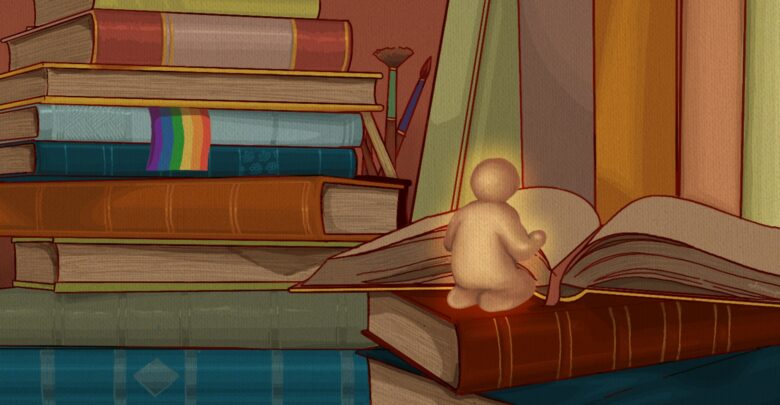Edmonton’s diverse literary landscape: Alphabet Soup and The Polyglot Hub
Alphabet Soup Bookstore and The Polyglot Hub are vital to the diverse and unique literary community in Edmonton.
 Ananya Shukla
Ananya ShuklaEdmonton has a substantial number of book stores throughout the city. From corporations like Indigo to well-known local favourites like Audreys, there are dozens of bookstores to explore. In a world where fast-paced online content sets book-related trends, it’s important more than ever to ensure the most important stories are told. It’s also vital that these stories are available to us from local businesses here in Edmonton.
While there are many local bookstores that curate content from local and diverse authors, two Edmonton-based businesses — Alphabet Soup Bookstore and The Polyglot Hub — are unique in the content they promote.
Alphabet Soup Bookstore
Founded in June of this year, Alphabet Soup is a Queer pop-up and market-based bookstore. It aims to provide exclusively Queer books — including those with 2SLGBTQIA+ characters, storylines, and authors. Kaitlyn Petry, the founder of Alphabet Soup, detailed its creation, reception, and future aspirations.
Petry explained that the inspiration behind Alphabet Soup came from the fact that when browsing for books in stores, you often have to “pick up every book” to see if it’s Queer.
“[I thought], what if there was a niche bookstore but only serving Queer books where you could walk in and every single book on the shelf was Queer and it was not a question. And it just sounded like such a fun dream.”
Petry expressed how important it is for her to select a variety of books that are representative of various identities. She explained that when she first began doing markets in the city, there was demand for genres she hadn’t thought of.
“I’m learning every month what our readership wants [and] what’s selling. We had a lot of people come and say ‘are any of these books polyamorous?’ And I was like, wow, that’s not something that I thought there is going to be huge demand for. So now let me go back and and see what I can bring in.”
“My goal with Alphabet Soup is to provide an affirming book buying experience,” Petry says
The online and market-based bookstore has only been open for a few months, with Petry currently working out of her living room. While the operation is still small, she explained how its growth has been steady.
“When I first started, I only had one distributor. Now I have four or five distributors. So we’re getting a little more selective,” she said.
The bookstore is not exclusive in the types of authors it showcases. However, Petry described how bringing in independently published authors has exhibited great success. She gave the example of books by transgender authors, and how they are sometimes “more nuanced” in the representation they give.
“Independently published authors [are] writing from [their] own experience. They can have a more nuanced and layered look at what kind of representation they’re giving,” she explained.
While Petry isn’t sure what’s in store for Alphabet Soup in regards to a physical location, she said that vending at markets and selling online has been successful.
“My goal with Alphabet Soup is to provide an affirming book buying experience. Where you can come to the table and you find something that feels representative to you.”
The Polyglot Hub
The Polyglot Hub, founded in 2016 in Edmonton by Adriana Oniță, started off as a literary magazine. Now, eight years later it has evolved into a “hub” that publishes annual magazine issues, chapbooks, and hosts workshops. Catalina Morales Vélez, the Polyglot’s marketing and communications director, described how she joined the Polyglot team, and the overall vision as an organization.
The Polyglot publishes magazines in various languages. According to Vélez, Oniță had a desire to publish in languages other than English and French. She noted the lack of a platform to share these languages.
“[Canada] is every single country that has [people] come here to find another way of living or experiencing something else. And we come with our roots. We come with other languages that need a platform.”
Before Vélez joined The Polyglot team she started off as a contributor. She first submitted to the fourth issue, Lunch Box, which commemorated Canada’s multicultural food scene.
“It was such a fantastic experience to be able to write in Spanish and English, the way that my brain was working back then. Both languages 100 per cent made sense [to me].”
The Polyglot publishes multilingual content from all over the world
The Polyglot is not limited to only publishing work by Edmonton and Canadian-based authors. They accept submissions from all around the world, with an aim to publish a wide variety of languages and representation of cultures.
Vélez described one of the issues they published as an example of the type of multilingual and specified content The Polyglot aims to amplify. 用心 (yong sum) is the 11th issue which contains works in 17 different languages, with the title being in Cantonese.
She also recalled when around the start of the the Russo-Ukraine war, The Polyglot received a submission from a Russian writer. She recounted how they received backlash for publishing the work.
“You never know when you’re going to trigger with art and with words. [The] situation is how you approach it. We’re [always] looking to use the difference as a door to connect with each other. So if the difference is what’s going to upset you, then we’re not doing our job.”
In terms of the magazine’s development since its foundation, Vélez explained that they hope the magazine’s format remains accessible.
“A magazine should be something that you can just grab and walk around or give to someone. It is supposed to be access to information or literature in a less complex way.”




